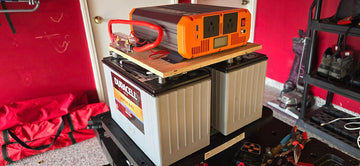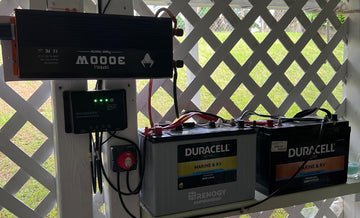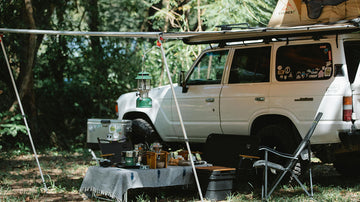Many people ask, can a car inverter power a fridge? The answer is yes, if you are planning a long drive, camping trip or picnic, your car fridge will be a key part of keeping your food and drinks fresh. A car inverter can convert the direct current (DC) supplied by your car battery into the alternating current (AC) needed to power your fridge.
Understanding car inverters
A car inverter is a device that converts the direct current (usually 12V or 24V) supplied by the car battery into alternating current (AC) for domestic use. It is one of the key components of the vehicle's electrical system and can power various household appliances such as portable fridges, laptops, mobile phone chargers and so on.
Inverter process:
An inverter uses electronic circuitry to convert DC power into AC power. Its core technology includes:
- Oscillator circuit: Converts DC to a high frequency AC signal.
- Transformer: Changes the voltage so that the output voltage is suitable for household appliances (e.g. 110V or 220V).
- Filter: Removes noise from the waveform and outputs a stable pure sine wave or corrected wave.
The power range of car inverters is usually between 100W and 3000W, and choosing the right power must be based on the needs of the device being used. Below are common power levels and the devices they support:
| Power Range | Supported Devices |
| 100W-300W | Small electronic devices (mobile phone chargers, cameras, tablets) |
| 300W-500W | Mid-sized equipment (laptops, portable speakers, small LED lights) |
| 500W-1000W | Large appliances (portable fridges, mini TVs, small power tools) |
| 1000W-3000W | High power appliances (household fridges, electric kettles, electric drills, microwaves, etc.) |
When powering a portable fridge, the power of the vehicle inverter should be at least 1.5 times the rated power of the fridge to cope with the starting power of the fridge compressor.
Benefits of car inverter for refrigerator
A car inverter plays a crucial role in powering portable refrigerators during travel, camping, or road trips.
Enables on-the-go refrigeration
With a car inverter, you can operate a portable fridge or small refrigerator using your vehicle’s DC power, allowing you to preserve food, beverages, and medications while traveling. This is particularly useful for:
- Road trips: Keeping drinks cold and food fresh for long hours.
- Camping: Storing perishables without the need for ice or external power sources.
- Emergency use: Maintaining the temperature of essential medications (e.g., insulin) during power outages.
Energy efficiency
Modern car inverters are designed to maximize energy efficiency. When paired with a high-quality portable fridge, they consume minimal power, ensuring longer usage time without draining the vehicle’s battery significantly.
Compatibility with multiple refrigerator types
Car inverters are versatile and can support a range of portable fridge types, including:
- Thermoelectric coolers: Use less energy but are ideal for cooling beverages.
- Compressor-based refrigerators: Provide superior cooling and freezing capabilities, suitable for long-term food storage.
Cost savings
Investing in a car inverter and a portable refrigerator eliminates the recurring expense of purchasing ice or relying on costly gas-powered refrigeration units.
Common power ratings for portable car refrigerators
The power consumption of portable refrigerators varies depending on their size and cooling technology. Here are some common car fridge capacities and inverter powers:
| Fridge capacity | Power consumption | Inverter recommendation |
| 5-10 liters | 30-50W (suitable for storing drinks or small snacks) | 100-150W inverter |
| 15-30 liters | 50-70W (ideal for solo travel or short trips) | 150-300W inverter |
| 40-50 liters | 70-100W (commonly used for family trips or camping) | 300-500W inverter |
| 60+ liters | 100-150W (high-capacity fridges with freezer compartments, suitable for RVs or extended camping trips) | 500W+ inverter |
Choosing the right car inverter for refrigerator
Choosing the right on-board inverter for your portable refrigerator is essential to ensure smooth operation, energy efficiency and long-term reliability. Here are some things to consider when choosing a vehicle inverter:
Power matching
To choosethe right on-board inverter, it is important to understand the power requirements of your refrigerator:
- Running power: This is the continuous power required to run the refrigerator. A portable refrigerator may require 50W-100W of power for normal operation.
- Starting power: Refrigerators with compressors typically require 2-3 times the running power to start. For example, a refrigerator running at 100W may require 200W-300W to start.
It is recommended to select an inverter with a continuous power rating slightly higher than the running power of the refrigerator, and to ensure that the surge power of the inverter can handle the starting load of the refrigerator. For example, if the refrigerator is running at 70W and starting at 140W, it is recommended to choose an inverter with a rated power of 150W and a peak power of 300W.
Efficiency
Car inverters typically have efficiencies in the range of 70-95 per cent, and it is recommended that you choose an inverter with an efficiency of 85 per cent or higher. High efficiency is essential for long-term use, especially if the inverter is used for long periods of time. High efficiency inverters minimise energy loss, reduce heat generation and energy wastage and help to extend battery life. It also optimises battery usage and prevents battery discharge when the vehicle is switched off.
Note that pure sine wave inverters should be selected for compressor fridges as they provide clean and stable power with minimal energy loss.
Protection features
A reliable inverter should have built-in protections to protect your refrigerator, car battery and electrical system:
- Overload protection: Prevents damage if the power demand exceeds the inverter's capacity.
- Thermal protection: Automatically shuts down the inverter if it overheats.
- Low voltage shutdown: The inverter automatically shuts down if the battery voltage is too low, protecting the battery and ensuring it has enough power to start the car.
Choose an inverter with these protections, especially if you plan to use it for a long time.
Connection methods
There are two main ways to connect the car inverter to the car's power supply:
1. Cigarette lighter connection:
Pros:
- Easy to install, no specialist knowledge required.
- Suitable for low power devices (usually below 150W).
Cons:
- Limited by the power limitations of the cigarette lighter fuse (typically 10A-15A, approximately 120W-180W).
- Prolonged use may result in overheating or blown fuses.
2. Direct battery connection:
Pros:
- Can support high power devices (over 300w) such as high performance refrigerators or other high power electrical devices.
- More stable power supply with less voltage fluctuation.
Cons:
- Requires professional installation and incorrect connection may damage the battery or inverter.
- Prolonged use may lead to over-discharge of car batteries.
For fridges under 150W, the cigarette lighter socket is usually sufficient. For higher wattage fridges or prolonged use, a direct battery connection with appropriate fusing is recommended.
See More: Choose the Best Power Inverters for Car
How to use the car inverter safely
To ensure the safety of your equipment and your vehicle, it is important that you use your vehicle inverter correctly.
Ensure power matching
Understanding the power requirements of your equipment and choosing the right inverter is the first step to safe use. The power of the inverter should be slightly higher than the total power requirements of the connected appliances, especially for appliances such as refrigerators which typically have two to three times the start-up power as the running power. Overloading can not only damage the inverter, but also pose a risk to the vehicle's electrical system.
The right connection
Choosing the right connection method is also an important part of safety. For lower power appliances, the inverter can be connected directly to the cigarette lighter socket, but make sure the plug is secure to avoid overheating or short-circuiting due to loosening. If you need to power high power appliances, such as a high capacity fridge, it is recommended that you connect the inverter directly to the car battery.
For direct connection, it is necessary to use cables with appropriate specifications and to ensure that the positive and negative terminals are connected correctly to avoid damage to the equipment due to reverse connection. It is also advisable to add a fuse to the circuit to improve overall safety and avoid the problem of the cable overheating due to excessive current.
Avoiding over-discharging the battery
To avoid over-discharging the car battery, it is important to monitor the battery voltage when using the inverter for long periods of time. Many high quality inverters are equipped with a low voltage cut-off function, which can automatically stop working if the battery voltage is too low, thus protecting the battery life.
Even if the inverter does not have such a feature, users are advised to check the battery status regularly and try to avoid prolonged high load operation with the vehicle switched off so that the engine cannot be restarted.
Ensure good ventilation
The car inverter generates heat during operation and must therefore be placed in a well-ventilated area. Never place the inverter in a hot or humid environment, such as inside a car in direct sunlight or near the engine. This will not only affect the efficiency of the inverter, but may also cause it to fail due to overheating.
Quality inverters are usually equipped with an overheating protection that automatically shuts down if the internal temperature is too high to prevent damage, but users should still pay attention to the heat dissipation conditions of the environment in which they are used.
Regular inspections
It is also important to check the condition of cables and connections regularly. If you notice any signs of wear, looseness or overheating of the cables, they must be replaced or adjusted immediately to avoid causing a short circuit or even a fire. Finally, strict compliance with the inverter's operating instructions is the key to safety. The design and function of each inverter may vary. Users should read the product manual carefully before use to understand the correct start-up and shut-down procedures, as well as the limitations of the equipment.
FAQ
Q: Can I power my fridge with my car?
A: Yes, you can power a fridge with your car. Just be sure to monitor your battery power while traveling to ensure there is sufficient power for the fridge.
Q: How long will a refrigerator run on an inverter?
A: The amount of time a refrigerator can run on an inverter depends on several factors, including the fridge's power consumption, the capacity of the battery powering the inverter, and the efficiency of the inverter itself.
Q: Will a 1000-watt power inverter run a refrigerator?
A: Yes, a 1000-watt power inverter can run a refrigerator, but whether it works effectively depends on the refrigerator's power requirements, particularly its startup wattage and running wattage.













